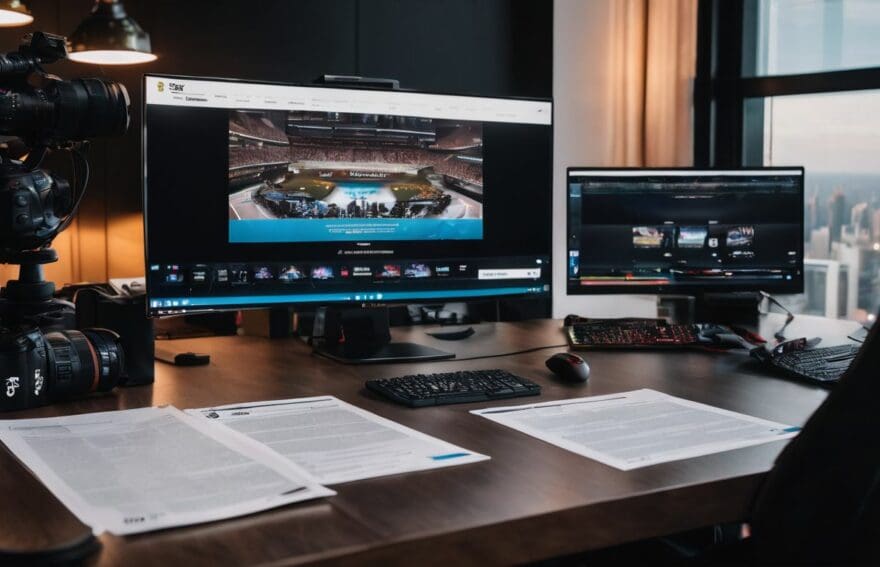The Legal Landscape of Esports Teams and Player Contracts

Updated On: October 24, 2025 by James Connolly
Esports is truly soaring to new heights, but behind the dazzling screens and thunderous applause, players and teams are entangled in intricate legal skirmishes. We understand the grind all too well; we’ve devoted endless evenings poring over player contracts with a fine-tooth comb, ensuring rights and futures remain secure—astonishingly, the global esports market is on track to surpass $1 billion in revenue.
With our shared wisdom at your disposal, you’ll be adept at navigating through the complex layers of contract jargon to clinch fair deals and shield your interests. Come along then, let’s unravel these puzzles together so that you’re fully equipped for empowerment on this thrilling journey!
Understanding the Esports Industry
The esports industry has experienced significant growth and popularity in recent years, attracting a global audience of passionate gamers. However, it also faces various legal challenges that need to be addressed to ensure the industry’s continued success and sustainability.
Growth and popularity
Esports has skyrocketed in popularity, transforming from niche gaming competitions to a global phenomenon with millions of followers. We’re witnessing arenas fill up with avid fans and online streams capturing record-breaking viewerships.
This explosive growth comes hand-in-hand with substantial financial investments and sponsorship deals that are reshaping the entertainment landscape. Big-name brands are jumping on board to align themselves with top teams, which means more marketing dollars flowing into the industry.
As players become stars, we’re seeing their influence extend beyond the screen. They secure endorsements that were once reserved for traditional sports athletes, highlighting esports’ ascent in mainstream culture.
However, this newfound fame brings its own set of challenges in the legal landscape where contract negotiations and player rights become increasingly complex topics to navigate. Moving forward, understanding these intricacies is crucial for everyone involved in esports – whether you’re a seasoned pro gamer or at the beginning of your digital adventure.
Next up are the entanglements faced within this booming sector: “Challenges in the legal landscape”.
Challenges in the legal landscape
Navigating the legal landscape in esports comes with its fair share of challenges. Issues such as copyright disputes and contractual complexities are common roadblocks that teams and players must address.
Additionally, ensuring compliance with federal and state wage and hour laws when working with minor players is crucial to avoid potential legal pitfalls. Moreover, understanding intellectual property rights and competition law is essential for safeguarding the interests of all parties involved in the industry.
Negotiating contracts effectively requires a deep understanding of legal obstacles specific to esports. Payment provisions demand particular attention to ensure fairness for everyone involved, while collective bargaining could potentially offer a solution by increasing transparency in contracts within the sector.
Regulation in the Esports Industry
Regulation in the esports industry involves government involvement, contract laws, and wage and hour laws for minor players. Navigating these regulations is essential for teams and players to operate within the legal framework of the industry.
Government involvement
Government involvement in the esports industry encompasses a range of regulatory and legal aspects. These could include legislation around competition law, intellectual property rights, and wage and hour laws for minor players.
With an increasing spotlight on esports, governments around the world are stepping in to establish clear guidelines and regulations to ensure fair play, protect intellectual properties, and safeguard the rights of players.
To navigate this legal landscape effectively, it is crucial for esports teams and players to stay informed about governmental involvement in the industry. Understanding these regulations will help them negotiate contracts, endorsements, and sponsorships more effectively while ensuring compliance with all legal requirements related to player representation and team ownership.
Contract laws
Having understood the government’s involvement in regulating the esports industry, it’s crucial to delve into contract laws, which play a significant role in shaping the legal foundation of player agreements and team sponsorships.
Esports teams and players must be well-versed in the specifics of contract laws that govern their engagements. These laws outline vital aspects such as contract duration, salary and benefits, non-disclosure agreements, as well as payment and royalty provisions.
It is essential for all parties to thoroughly review these contracts to ensure that rights and obligations are explicitly defined and protected.
Wage and hour laws for minor players
Esports teams with minor players need to adhere to federal and state wage and hour laws. These regulations ensure that young players are not exploited and receive fair compensation for their work.
It’s crucial for esports organisations to understand these laws in order to protect their underage players from any labour law violations.
These regulations provide a framework for the maximum hours minors can work, as well as minimum wage requirements. Compliance with these laws is essential for safeguarding the rights of minor players, promoting fairness, and upholding ethical standards within the industry.
Legal Considerations for Esports Teams and Players
Esports teams and players must navigate a complex legal landscape when it comes to player contracts, endorsements, and intellectual property rights. Understanding the legal considerations in esports is crucial for protecting the interests of both parties involved.
Player contracts
Player contracts in esports are crucial legal documents that outline the terms and conditions of a player’s engagement with a team. These agreements cover essential aspects such as contract duration, salary, benefits, and non-disclosure agreements.
It is vital for players to thoroughly review these contracts to safeguard their rights and ensure fair treatment. Payment and royalty provisions should be meticulously evaluated to guarantee equitable compensation for all parties involved.
Esports player agreements are legally binding contracts that require careful negotiation and understanding by both parties. They must clearly define the rights and obligations of each party involved in the agreement while protecting intellectual property rights and complying with competition laws.
Endorsements and sponsorships
After understanding the intricacies of player contracts, it’s crucial for esports teams and players to grasp the significance of endorsements and sponsorships. Securing lucrative brand partnerships can significantly boost a player’s earnings and a team’s financial stability.
Endorsements provide players with opportunities to promote products or services, while sponsorships offer financial support for teams in exchange for branding exposure during events and tournaments.
It’s essential for esports professionals to carefully review the terms of these agreements to ensure that they align with their values, image, and long-term career goals.
Furthermore, when negotiating endorsements and sponsorships, it’s vital to consider how these deals may impact intellectual property rights. Protecting one’s personal brand is crucial in an industry where individual personalities often drive success.
Intellectual property
Esports teams and players should pay close attention to intellectual property rights in contracts and agreements. This includes protecting original content, such as logos, team names, and other branding assets.
Understanding copyright laws and trademark regulations is crucial when dealing with endorsements, sponsorships, and merchandising opportunities within the esports industry. It’s important for all parties involved to clearly define ownership of intellectual property in contracts to avoid disputes down the line.
Protecting intellectual property can also involve navigating competition law to prevent unauthorised use of brand assets or trademarks by competing entities. Ensuring that rights related to creative works are properly assigned or licensed will help maintain the value of a team’s brand and allow for possible future monetisation through licensing deals or merchandise sales.
Key Components of Esports Player Agreements
In esports player agreements, key components include contract duration, salary and benefits, and non-disclosure agreements. To learn more about the legal considerations for esports teams and players, keep reading!
Contract duration
Esports player agreements typically specify the duration of the contract, outlining the period for which the player is committed to the team. This timeframe can vary widely depending on individual circumstances and negotiations.
It’s crucial for players and teams alike to carefully consider this aspect, ensuring that both parties are satisfied with the length of commitment. Additionally, thorough understanding and clarity around contract duration will help avoid potential disagreements or misunderstandings in the future.
The length of a contract often correlates with various factors such as performance expectations, salary structure, and endorsement opportunities. By factoring in these considerations into the negotiation process, players can secure contracts tailored to their needs while providing stability for teams.
Salary and benefits
Esports player agreements commonly outline the terms of salary and benefits. These may include payment structure, bonus incentives, healthcare coverage, and travel allowances. It’s vital for players to negotiate fair compensation that reflects their contributions to the team’s success.
Understanding royalty provisions and ensuring that they are clearly defined in contracts is also crucial for fair treatment in the industry.
Wage and hour laws are particularly important when it comes to minor players’ contracts in esports. Teams with underage players must comply with federal and state regulations regarding child labor to ensure fair working conditions and proper compensation.
Non-disclosure agreements
Esports teams and players may encounter situations where sensitive information needs to be protected. This is where non-disclosure agreements (NDAs) play a crucial role. These legal documents safeguard confidential details about team strategies, sponsorships, or game developments from being disclosed to third parties without permission.
NDAs are essential for maintaining the competitive edge of esports teams and protecting their intellectual property.
In these agreements, key components such as the duration of confidentiality, the scope of information covered, and consequences for breach should be clearly specified. For instance, if a player leaves an esports team, the NDA could outline how long they must keep sensitive information confidential even after their departure.
How to Navigate the Legal Challenges in Esports
When navigating the legal challenges in esports, it is important to develop strategies for addressing issues such as contract disputes and intellectual property rights. Additionally, seeking experienced legal counsel can provide invaluable guidance in protecting the interests of both esports teams and players.
Strategies for addressing legal issues
Understanding the legal landscape of esports is crucial for teams and players alike. One strategy for addressing legal issues in esports is to seek experienced legal counsel who understands the unique challenges of the industry.
This can help navigate complex contracts, intellectual property rights, and competition laws that often arise in the fast-paced world of gaming. Additionally, fostering open communication between teams and players while crafting agreements can help ensure that all parties’ rights and obligations are clearly defined and protected.
Another effective strategy involves staying informed about current laws and regulations in the esports industry. As this landscape continues to evolve, it’s essential to remain updated on government involvement, contract laws, as well as wage and hour laws for minor players.
Importance of experienced legal counsel
Experienced legal counsel is essential in navigating the complex legal landscape of esports contracts. They bring expertise in negotiating player agreements, endorsements, and sponsorships, ensuring that all parties’ rights and obligations are clearly defined and protected.
With their guidance, esports teams and players can address legal challenges such as copyright issues and contract complexities. Additionally, they help to negotiate fair payment and royalty provisions to ensure fair treatment for everyone involved.
Understanding the integral role of experienced legal counsel in the esports industry is crucial for protecting the interests of both players and teams. Their knowledge and experience enable them to navigate the nuances of esports contracts effectively, safeguarding the rights of all parties involved while fostering a transparent environment for negotiations.
Conclusion
Navigating the legal landscape of esports teams and player contracts requires a thorough understanding of regulations and laws that govern the industry. Esports players and teams must carefully negotiate contracts, endorsements, and sponsorships to protect their rights.
With collective bargaining and experienced legal counsel, players can address legal challenges effectively in this dynamic industry. Understanding the nuances of gaming contracts is crucial for fair treatment and success in the fast-paced world of esports.
FAQs
1. What do player contracts in esports include?
Player contracts in esports cover game performance, team obligations and endorsements, whilst also addressing laws and regulations relevant to sports law.
2. How important are sponsorships and endorsements in esports?
Sponsorships and endorsements can be crucial for teams and players, requiring carefully crafted contracts with sponsors that respect legal standards within the esports industry.
3. Can young gamers sign contracts in the world of competitive gaming?
In most regions, minor contracts in esports need a guardian’s approval due to legal regulations protecting minors; these agreements must comply with laws governing youth employment.
4. Is collective bargaining a thing in esports just like traditional sports?
Yes, collective bargaining is becoming more common as it allows players to negotiate terms together regarding their gaming contracts within the structured environment of organised leagues.



